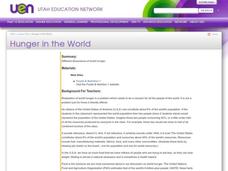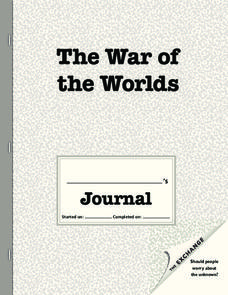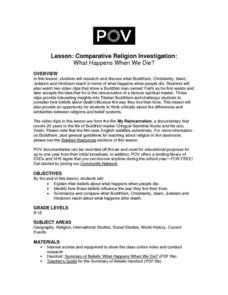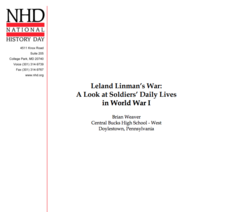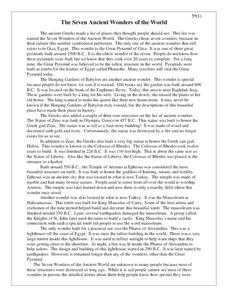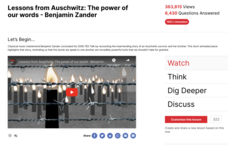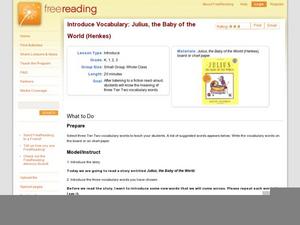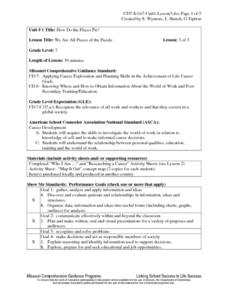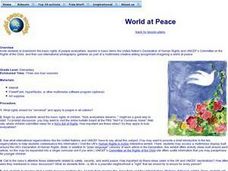National Endowment for the Humanities
Chronicling America: Uncovering a World at War
As part of a study of World War I, class members read newspaper articles from the time that urge American involvement, non-involvement, or neutrality. Using the provided worksheet, groups analyze the articles noting the central argument...
Curated OER
Hunger in the World
Background information is a great tool for any teacher. This resource provides background information on nutrition and world hunger, as well as ten different activity options to help learners understand this global issue. Each activity...
Curated OER
Hunger in the World
Consider various aspects of world hunger in this writing lesson. After taking a pre-test, middle and high schoolers play a map game, analyze and discuss world statistics, and write a report on an assigned country. The lesson can apply to...
Curated OER
World Religion Day: Reading Activities
If your class is observing World Religion Day in January, use this resource to provide a research and response opportunity. A short informational reading (available as an MP3 download for auditory learners and listening exercises) is the...
Indiana University
World Literature: "One Evening in the Rainy Season" Shi Zhecun
Did you know that modern Chinese literature “grew from the psychoanalytical theory of Sigmund Freud”? Designed for a world literature class, seniors are introduced to “One Evening in the Rainy Season,” Shi Zhecun’s stream of...
Curated OER
Compare and Contrast Timelines of the World
Seventh graders create a classroom timeline of important world events. This lesson is meant to be used during the entire school year. As the school year goes along, events are added to the timeline as chosen by the class. The events are...
Curated OER
The United States and the World
Journey through highlights of the late 19th and early 20th century with your history class. Topics covered are the highlights of Theodore Roosevelt's presidency, the Spanish American War, the building of the Panama Canal, and World War...
National Endowment for the Humanities
Revolution '67, Lesson 2: What Happened in July 1967? How Do We Know?
Even in a world in which dozens of participants and curious onlookers record every controversial event, the basic facts of what happened are often in dispute. Revolution '67, Lesson 2 explores 1967 Newark, New Jersey using an examination...
Curated OER
The War of the Worlds
Read The War of the Worlds with your class. Then you can enhance the reading experience through the use of these worksheets. Keeping track of reading, recording reader response, and various activities pertaining to the book are included....
Curated OER
We Are the Champions
Can international sports events be indicative of a country's national pride? Learners consider how the Germany-hosted 2006 World Cup contributed to German cultural pride, and how the fundamentals of sports is celebrated around the world,...
NOAA
A Watery World
With about 70% of the earth's surface covered in oceans, it's fair to say that we live in a very wet world. Young scientists gain a better appreciation of this fact as they use maps to identify the world's ocean basins in the first...
Population Connection
A Demographically Divided World
Did you know that birth and life rates vary across the world? The resource, the second in a six-part series, discusses just how demographics differ across countries and why it might be the case. Scholars complete worksheets, watch...
Mountain View High School
The Big Religion Chart
This resource includes a list of over 40 world religions and their major features, such as brief summaries of their origins and history, beliefs in god and an afterlife, practices, foundational texts, etc. The document also includes an...
American Documentary
Comparative Religion Investigation: What Happens When We Die?
How do different religions offer explanations for what happens when we die? Invite your learners to consider the variance and complexity of religious beliefs, and to research and compare/contrast the concept of death and afterlife...
National History Day
Leland Linman’s War: A Look at Soldiers’ Daily Lives in World War I
Hunkering down in the trenches of World War I, Leland Linman decided to write a journal about his experiences. By reading Linman's entries in the fourth installment of an eight-part lesson plan series, scholars get a firsthand look at...
Curated OER
The Seven Ancient Wonders of the World
Did you know only one of the Seven Wonders of the World still exists today? Here is a historical reading passage that provides readers with a brief history of the seven marvelous wonders.
University of the Desert
What Are the Possible Causes of Cultural Misunderstanding?
Why do cultural misunderstandings happen? What causes stereotypes, and what is dangerous about them? After viewing some possible explanations to these questions provided by young adults around the world, your learners will discuss how...
TED-Ed
Lessons from Auschwitz: The Power of Our Words
Some words are best left unspoken. Words matter, according to Benjamin Zander, conductor, teacher, and lecturer. To illustrate his point, Zander recounts a story told to him by a survivor of Auschwitz. As a result of her experience this...
Sharp School
World History Timeline Project
Using and online tool called TimeRime, class members create timelines that include what they consider to be the top 10 most important events from the first semester of world history. The first few pages of the assignment focus on how to...
Curated OER
Introduce Vocabulary: Julius, the Baby of the World (Henkes)
Lilly is jealous when her new little brother is born; explore vocabulary in context through Kenvin Kenkes' story Julius the Baby of the World. Suggested words for this text are: constantly, disguise, disgusting, extraordinary, quiver,...
Facing History and Ourselves
How Should We Remember?
We must remember the past in order to avoid its mistakes. Young historians analyze the importance of historical remembrance using primary and secondary documents, as well as video clips. They then study the creation of a World War II...
Curated OER
Introduce Vocabulary: How to Make an Apple Pie and See the World (Priceman)
Ask budding readers, "How do you make an apple pie?" You may get many answers, but Marjorie Priceman takes the cake with her idea in How to Make an Apply Pie and See the World, an adventurous tale full of wonder and new vocabulary. Using...
Curated OER
We Are All Pieces of the Puzzle
Seventh graders are shown a small puzzle. They are explained that without all the pieces, a puzzle is not complete. Students are explained that the same principle applies to the world of work. They are also explained that each person who...
Curated OER
World at Peace
Students explore world peace by creating a PowerPoint presentation. In this human rights lesson, students discuss the current conditions of human rights around the planet and view an on-line exhibit hosted by UNICEF. Students discuss...




